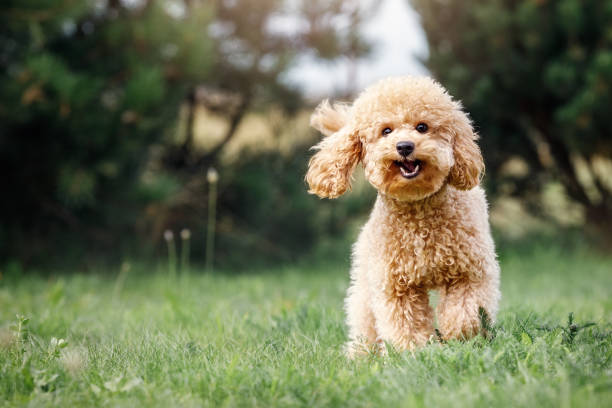Can poodles be left alone for long periods?
Introduction: The Myth of the Independent Poodle
Poodles, with their elegant appearance and intelligent nature, have long been beloved companions in households worldwide. However, there is a common misconception that poodles can easily adapt to long periods of solitude. In this article, we will explore the truth behind the question: “Can poodles be left alone for long periods?” We will delve into the inherent social nature of poodles, the potential risks involved in leaving them alone, and provide practical solutions to ensure their well-being and happiness.
Can Poodles Be Left Alone for Long Periods? The Truth Unveiled
Poodles are known for their high level of intelligence and their need for social interaction. They thrive on human companionship and may suffer from separation anxiety if left alone for extended periods. While each poodle is unique and individual factors such as age, temperament, and training can influence their ability to cope with solitude, it is generally not recommended to leave poodles alone for long periods without proper preparation and alternatives in place.
The Social Nature of Poodles
Poodles are highly social animals that form strong bonds with their human family members. They enjoy being part of the household activities and are happiest when they have regular interactions and mental stimulation. Leaving them alone for extended periods can lead to feelings of loneliness, boredom, and anxiety.
Potential Risks of Leaving Poodles Alone
Leaving poodles alone for long periods can have negative consequences on their physical and emotional well-being. Here are some of the potential risks:
1. Separation Anxiety: Poodles are prone to separation anxiety, which can manifest in destructive behavior, excessive barking, or even self-harm. This anxiety arises from their deep attachment to their owners and can be intensified when left alone for extended periods.
2. Boredom and Lack of Stimulation: Poodles are intelligent and energetic dogs that require mental and physical stimulation to stay happy and healthy. Without proper interaction and exercise, they can become bored, leading to behavioral problems and a decline in their overall well-being.
3. Accidents and Health Issues: When left alone for long periods, poodles may be unable to control their bladder and bowels, leading to accidents in the house. Additionally, the stress and anxiety of being alone can impact their immune system, making them more susceptible to health issues.
Practical Solutions for Leaving Poodles Alone
While it is best to minimize the time poodles spend alone, there are practical solutions to ensure their well-being when you cannot be with them. Consider the following options:
1. Pet Sitters or Doggy Daycare: Hiring a trusted pet sitter or enrolling your poodle in a reputable doggy daycare facility can provide them with the social interaction and supervision they need during your absence.
2. Interactive Toys and Puzzles: Keep your poodle mentally stimulated by providing them with interactive toys and puzzles that challenge their problem-solving skills and keep them entertained while you’re away.
3. Scheduled Walks and Exercise: Before leaving your poodle alone, ensure they receive ample exercise and playtime to help tire them out and alleviate boredom. A tired poodle is more likely to rest and be content in your absence.
4. Crate Training: Proper crate training can offer a safe and comfortable space for your poodle when they need to be left alone. However, it’s important to introduce the crate gradually and ensure it remains a positive and pleasant environment for your furry friend.
5. Enlist the Help of Friends or Family: If possible, ask trusted friends or family members to check in on your poodle during the day, providing them with companionship and a sense of security.
6. Consider a Companion: If you frequently find yourself away from home for extended periods, you may consider getting a second poodle or another compatible canine companion to keep your poodle company.
Frequently Asked Questions about Leaving Poodles Alone
Q1: Can poodles be left alone all day while I’m at work?
A1: Leaving a poodle alone all day without any interaction or breaks can lead to distress and behavioral problems. It is best to arrange for someone to visit or consider doggy daycare to provide companionship and stimulation.
Q2: Are poodles more prone to separation anxiety compared to other breeds?
A2: Poodles, due to their social nature, can be more susceptible to separation anxiety. However, individual temperament and previous experiences also play a role. Proper training and gradually increasing alone time can help alleviate separation anxiety.
Q3: Without experiencing negative effects, how long can one leave a poodle alone?
A3: While experts generally recommend limiting the time a poodle spends alone to a maximum of 4-6 hours, there is no definitive answer. Beyond that, it is important to provide them with attention, exercise, and mental stimulation.
Q4: Can leaving the TV or radio on help keep my poodle company?
A4: Leaving the TV or radio on can provide some background noise and mimic human presence, which may help alleviate loneliness for some poodles. However, it is not a substitute for actual companionship and interaction.
Q5: Can poodles be left alone overnight?
A5: Leaving a poodle alone overnight is generally not recommended. Poodles thrive on routine and human companionship, so it is best to have alternative arrangements in place if you are unable to be with them.
Q6: Will my poodle outgrow separation anxiety?
A6: While some poodles may outgrow separation anxiety as they mature, others may require ongoing management and training. Consultation with a professional dog trainer or behaviorist can provide guidance tailored to your poodle’s specific needs.
Conclusion: Balancing Independence and Companionship
In conclusion, poodles are not well-suited for long periods of solitude due to their social nature and need for companionship. While each poodle is unique, it is essential to prioritize their mental and physical well-being by providing them with social interaction, mental stimulation, and alternatives when you need to be away. By understanding their needs and taking the necessary steps to ensure their happiness, you can create a balanced and fulfilling life for both you and your beloved poodle companion. Remember, poodles thrive when they have the love and attention they deserve!




